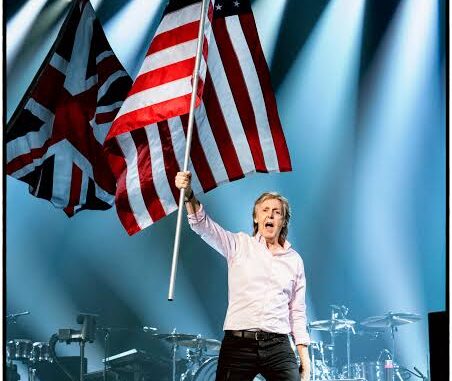
In the history of popular music, few figures loom as large—or as enduring—as Paul McCartney. From his earliest days as a young songwriter in Liverpool to his global influence as a solo artist and cultural ambassador, McCartney’s story is not just about fame or success; it’s about transformation. His journey mirrors the evolution of modern music itself, and the lasting bond he helped forge between British and American sound.
Born in 1942 in postwar Liverpool, McCartney grew up surrounded by a deep love of music. His father, a jazz musician, encouraged his son’s early interest in melody and harmony. It wasn’t long before young Paul picked up a guitar and began writing songs—songs that would, before long, help rewrite the rules of pop music. Everything changed when he met John Lennon in 1957. Together, they would form the nucleus of what would become the most influential band in history: The Beatles.
The rise of The Beatles in the early 1960s was a cultural shockwave. British bands had rarely broken through in the American market—but that changed in February 1964, when The Beatles arrived in New York and performed on The Ed Sullivan Show to an audience of over 70 million. McCartney, with his left-handed bass guitar and effortless harmonies, became an instant icon. It wasn’t just about British music finding an audience in America; it was about changing what American music could be.
Paul McCartney’s songwriting—first with Lennon, later on his own—was a fusion of influences. From the skiffle and music hall traditions of the UK to the blues, soul, and rock ‘n’ roll roots of America, his music became a transatlantic blend of style and sensibility. Tracks like “Yesterday,” “Let It Be,” and “Hey Jude” weren’t just hits; they became emotional touchstones, uniting audiences across continents.
But McCartney’s influence didn’t stop when The Beatles split in 1970. Instead, he entered one of the most productive phases of his career, forming the band Wings and continuing to push musical boundaries. Albums like Band on the Run and Ram showed his range as a composer, producer, and lyricist. He wasn’t trying to replicate the Beatles’ magic—he was expanding upon it.
Throughout the decades, McCartney maintained a rare relevance. He was never content to rest on nostalgia. Whether collaborating with Stevie Wonder in the ’80s, Nirvana’s Dave Grohl in the 2010s, or Kanye West and Rihanna in 2015, he showed an eagerness to evolve while honoring his roots. His music always seemed to reflect a sense of optimism and craftsmanship that transcended generational boundaries.
More than just a musician, McCartney became a symbol of cultural diplomacy. His work helped bridge a gap between the UK and U.S., not only musically but socially. He was knighted in 1997 for his contributions to British culture, and in America, he received the Library of Congress Gershwin Prize and Kennedy Center Honors—proof of his profound transatlantic impact.
Perhaps one of the most astonishing things about Paul McCartney is his creative longevity. While most artists fade with time, McCartney continued to release albums well into his 70s, tour the world with the energy of someone half his age, and inspire younger artists across all genres. Even now, his name evokes a rare mixture of reverence and warmth.
For all his achievements, McCartney remains deeply human. He’s spoken candidly about grief, especially following the loss of Lennon and his wife Linda, and about the joys of family, fatherhood, and creative freedom. That vulnerability has always been woven into his music, giving it a sincerity that has kept audiences listening for over six decades.
Paul’s relationship with the United States, in particular, has been one of mutual admiration. American fans embraced him as one of their own, while he frequently honored the country’s musical traditions—from covering Little Richard to performing at major U.S. events like Super Bowl halftime shows and presidential inaugurations.
As he embarks on yet another U.S. tour in 2026, McCartney isn’t just playing the hits. He’s continuing a lifelong dialogue with audiences on both sides of the Atlantic, reminding us that the power of a great song—and the soul behind it—never fades. His music isn’t bound by geography or era; it belongs to everyone.
From the streets of Liverpool to the stages of New York, Los Angeles, and beyond, Paul McCartney’s journey is a story of collaboration, innovation, and enduring magic. He didn’t just help launch the British Invasion—he helped invent the very idea of global pop. And he did it all with melody, humility, and a belief in the unifying power of music.

Leave a Reply